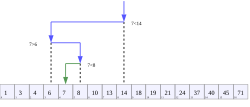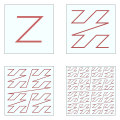In computer science, binary search, also known as half-interval search, logarithmic search, or binary chop, is a search algorithm that finds the position...
77 KB (10,006 words) - 10:57, 21 June 2025
In computer science, a binary search tree (BST), also called an ordered or sorted binary tree, is a rooted binary tree data structure with the key of each...
30 KB (3,137 words) - 05:17, 27 June 2025
In computer science, a self-balancing binary search tree (BST) is any node-based binary search tree that automatically keeps its height (maximal number...
8 KB (1,114 words) - 13:48, 2 February 2025
binary search tree (Optimal BST), sometimes called a weight-balanced binary tree, is a binary search tree which provides the smallest possible search...
19 KB (2,965 words) - 19:58, 19 June 2025
label associated with each node. Binary trees labelled this way are used to implement binary search trees and binary heaps, and are used for efficient...
36 KB (5,097 words) - 22:11, 28 May 2025
Tree traversal (redirect from Tree search algorithm)
depth-first search (DFS), the search tree is deepened as much as possible before going to the next sibling. To traverse binary trees with depth-first search, perform...
26 KB (2,894 words) - 19:29, 14 May 2025
application stores the entire key–value pair at that particular location. A Binary Search Tree is a node-based data structure where each node contains a key and...
5 KB (710 words) - 16:22, 6 January 2024
are hash tables and search trees. It is sometimes also possible to solve the problem using directly addressed arrays, binary search trees, or other more...
24 KB (2,802 words) - 02:21, 23 April 2025
Uniform binary search is an optimization of the classic binary search algorithm invented by Donald Knuth and given in Knuth's The Art of Computer Programming...
2 KB (262 words) - 10:09, 9 January 2024
they count the number of steps needed for binary search and related algorithms. Other areas in which the binary logarithm is frequently used include combinatorics...
42 KB (5,128 words) - 20:13, 16 April 2025
lists, such as binary search, when the element being searched for is near the beginning of the array. This is because exponential search will run in O...
10 KB (1,426 words) - 00:17, 20 June 2025
linear, binary, and hashing. Linear search algorithms check every record for the one associated with a target key in a linear fashion. Binary, or half-interval...
11 KB (1,453 words) - 16:18, 10 February 2025
state-of-the-art machine, using a linear search algorithm, and on Computer B, a much slower machine, using a binary search algorithm. Benchmark testing on the...
25 KB (3,683 words) - 17:34, 18 April 2025
achieved by using binary search instead. The following C-program is an implementation. // Integer square root (using binary search) unsigned int isqrt(unsigned...
26 KB (3,191 words) - 07:11, 19 May 2025
B-tree (section Sorted file search time)
data and allows searches, sequential access, insertions, and deletions in logarithmic time. The B-tree generalizes the binary search tree, allowing for...
53 KB (7,338 words) - 20:49, 1 July 2025
Tree sort (redirect from Binary tree sort)
A tree sort is a sort algorithm that builds a binary search tree from the elements to be sorted, and then traverses the tree (in-order) so that the elements...
5 KB (644 words) - 04:27, 5 April 2025
binary search is a variation of binary search that uses a specific permutation of keys in an array instead of the sorted order used by regular binary...
4 KB (397 words) - 14:35, 17 February 2025
Recursion (computer science) (section Binary search)
toFind, search lower half return binary_search(data, toFind, start, mid-1); else //Data is less than toFind, search upper half return binary_search(data...
62 KB (7,388 words) - 14:45, 29 March 2025
Trie (section Full-text search)
tree, is a specialized search tree data structure used to store and retrieve strings from a dictionary or set. Unlike a binary search tree, nodes in a trie...
31 KB (3,331 words) - 17:05, 30 June 2025
Learning augmented algorithm (section Binary search)
For this purpose machine learning can be used.[citation needed] The binary search algorithm is an algorithm for finding elements of a sorted list x 1...
6 KB (751 words) - 02:25, 26 March 2025
Red–black tree (redirect from Symmetric binary B-tree)
In computer science, a red–black tree is a self-balancing binary search tree data structure noted for fast storage and retrieval of ordered information...
78 KB (9,338 words) - 03:38, 25 May 2025
Compared to binary search where the sorted array is divided into two equal-sized parts, one of which is examined further, Fibonacci search divides the...
7 KB (903 words) - 14:37, 24 November 2024
B+ tree (redirect from B+ search trees)
context—in particular, filesystems. This is primarily because unlike binary search trees, B+ trees have very high fanout (number of pointers to child nodes...
25 KB (3,263 words) - 07:54, 1 July 2025
Stern–Brocot tree (section Mediants and binary search)
numbers, whose values are ordered from the left to the right as in a binary search tree. The Stern–Brocot tree was introduced independently by Moritz Stern (1858)...
17 KB (2,589 words) - 07:00, 27 April 2025
a ternary search tree is a type of trie (sometimes called a prefix tree) where nodes are arranged in a manner similar to a binary search tree, but with...
14 KB (1,784 words) - 21:43, 13 November 2024
interleaving the binary representations of its coordinate values. However, when querying a multidimensional search range in these data, using binary search is not...
21 KB (2,681 words) - 19:21, 8 February 2025
Quicksort (section Using a binary search tree)
Three common proofs to this claim use percentiles, recurrences, and binary search trees, each providing different insights into quicksort's workings....
71 KB (9,925 words) - 14:27, 31 May 2025
each element vary. Linear search is rarely practical because other search algorithms and schemes, such as the binary search algorithm and hash tables...
9 KB (1,271 words) - 03:40, 21 June 2025
between key values are sensible. By comparison, binary search always chooses the middle of the remaining search space, discarding one half or the other, depending...
14 KB (1,867 words) - 12:27, 13 September 2024
Priority queue (section Best-first search algorithms)
better bounds for some operations. Alternatively, when a self-balancing binary search tree is used, insertion and removal also take O(log n) time, although...
33 KB (5,009 words) - 21:16, 19 June 2025
















